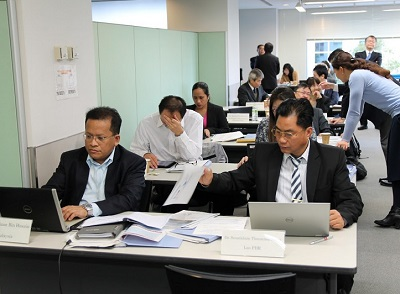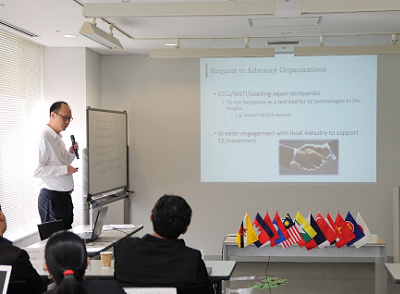Participants made final presentation on action plans for the future based upon all the information and experiences gained through the workshop.

4. ACTION PLANS: OUTCOMES OF THE WORKSHOP

Preparation of Action Plan after Small Group Discussion

Preparation of Action Plan (Singapore Case)
Action Plans of Each Participating Country
Cambodia
In the next two years, they will organize a working group to draft BEC and Management Guidelines to be followed by the development of building benchmark index in the next 3 years.
Indonesia
In the action plans, following actions were proposed: promotion of mandatory BEC in cities, raising awareness among local government leaders, revision of the national standard in building energy efficiency, capacity building for various kinds of persons, developing online tool/calculator for BEE, etc. Revision of the national standard on energy efficiency for buildings will be completed in this year, to be followed by the development of online tool/calculator for BEE and a benchmarking system on BEE in the next year. They will try to enforce BEC to their country in the same manner as Japan did in the past. The central government is supposed to let local governments apply it by way of raising awareness and capacity building efforts in 4 years’ time.
Lao PDR
The action plan included many items, such as announcement and implementation of National EE&C Policy, development of database, capacity building, coordination with Ministry of Public Work and Transportation (MPT) to finalize the draft BEC and so on.
Malaysia
In the action plan, logical approach was shown as follows: (1) to identify and engage stakeholders (government, private, academia, and community) and (2) to identify areas of focus (lifecycle stages) for regulation (design, procurement, construction and operation & maintenance). Also mentioned were measures for EE&C of buildings, such as legislation, building standard, green labelling, etc. Further commented was a future plan in which proper organizations (federal, state, local) should function in proper fields.
Myanmar
The presented action plan comprised items, such as (1) establishment of EE&C laws and regulations (data collection, BEC and energy efficiency standard, forming technical working groups, capacity building, etc.), (2) standard and labelling system, (3) energy manager training, (4) energy efficiency awareness campaign and (5) promoting renewable energy for buildings.
Philippines
Based on what they learned at the workshop, demonstrated was an action plan consisting of a ranking list of energy efficiency of buildings, minimum energy performance standard system, capacity building, energy efficiency award system, etc.
Singapore
On future plans, Mr Toh shared that they are looking into developing aspiration goals in-line with global trends towards Zero Energy Building (ZEB). Finally proposed was to enhance collaborative relations between Singapore and Japan with an idea of supporting ground-up initiatives and leveraging on Singapore to test-bed innovative energy efficiency technologies for the tropics.
Thailand
According to the presentation, enforcement and implementation of BEC on the basis of mutual understanding between DEDE and DPT by offering the idea to use only envelope design will be realized in a short term (6 months). The other plan stated in the action plan was correction/update/revision of the current BEC in an intermediate term (2 years), when the updated technologies learned in this workshop would be fully taken into consideration. Thailand requested to receive continuous support from Japan in this field.
Advisors’ comments
Dr. Petrichenko made a remark of appreciation on the whole program and encouraged all the participants to make full use of the results of the workshop after they went back to home countries.
Dr. Miyata had prepared two presentation slides for his advisory comments. The first slide was titled “What I have learned from the workshop”. The second one was “Target and Role Sharing”, with a two-axis graphic presentation. His pieces of advice were encouraging to the participants, too, for their future efforts to promote BEC.
Mr. Yoshitaka Ushio gave enriched remarks, referring to his slides used in his previous explanation. He stressed importance of “guidelines” in the whole process of establishing and executing BEC.
